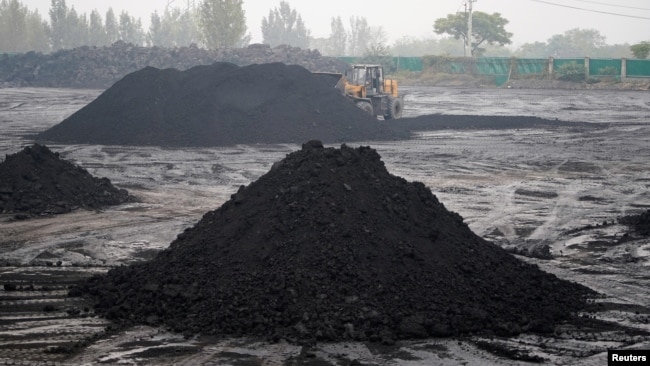我々の同盟国でないことが、とても残念です!
共産党が掲げた目標を達成することが第一義のChina!!
圧倒的な14億の人民を豊かにするため、その需要と消費を拡大させるためには、この地球は小さな問題なのでしょうか?
自分がもしこれから生まれてくるとしたら・・・・恐怖を感じる世界が。。。
今日もVOAでえいごを 楽しく学びましょう!!
中国、再び石炭火力発電を推進(和訳)
China Promotes Coal-burning Again
May 02,2022
中国は今年、石炭生産量を3億トン増加させる計画です。オブザーバーによれば、政府はこのような計画によって、成長が鈍化している中国経済を立て直すことを期待していると言います。
しかし、批判家は、石炭の増産は気候変動の原因となる炭素排出を減らす努力を阻害すると言っています。
報告された増産量は、2021年の中国の総石炭生産量の7%---41億トンを占めることになります。
中国は風力と太陽エネルギーへの最大の投資国の一つです。しかし、昨年の経済成長率の低下を受けて、最近になって指導者たちは石炭を燃やす電力を増やすように要求しています。電力不足は停電や工場の操業停止を引き起こしました。ロシアのウクライナ攻撃により、海外の石油や石炭の供給が途絶えるかもしれないという不安も加わりました。
石炭はエネルギー安全保障のために重要であると、政府関係者は4月20日の会議で述べ、生産拡大計画を承認しました。この情報は、経済紙Caixin(財新)が報じました。
与党はまた、中国経済の成長を助けるために発電所を建設しています。
世界各国政府は、大気の温暖化を産業革命以前の水準から2℃に抑えるよう努力することを約束しています。指導者たちは、自分たちが本当に望んでいるのは摂氏1.5度という制限だと言っています。
科学者たちは、たとえ世界が2度の目標を達成したとしても、海水の上昇、嵐の激化、植物や動物の絶滅といった脅威に直面すると述べています。また、暑さ、大気汚染、感染症などで死亡する人が増えることも予想されています。
中国は石炭の生産量、消費量ともにトップです。中国政府は、石炭火力発電の使用を廃止すると約束した他国政府への加盟を避けています。
習近平国家主席は2020年の国連演説で、中国の炭素排出量は2030年までに最高値に達すると述べました。しかし、その量の目標は設定しませんでした。習近平氏は、中国は2060年までにカーボンニュートラルの状態を目指すと述べています。つまり、大気中の汚染物質である炭素廃棄物を、排出する量と同じだけ除去する計画です。
中国は世界の排出量の26.1パーセントを生産しています。世界資源研究所によると、これは米国の12.8パーセントの2倍以上です。調査事業のロジウム・グループによると、中国はすべての先進国の合計よりも多く排出しています。
中国には大量の石炭があり、昨年燃やした44億トンのうち90%以上を生産しています。石油とガスの半分以上を輸入しており、指導者たちはこれをリスクと捉えています。
2060年までにカーボンニュートラルを達成するという中国の目標は、目標通りに進んでいるように見えます。しかし、環境調査局のクレア・ペリー氏は、より多くの石炭を使用することで、この目標が危うくなり、”少なくとも遅くなり、よりコストがかかる”ことになりかねないと述べています。
石炭を推進することで、2030年までに排出量が”必要以上に高くなる”とペリーは付け加えています。
中国は輸入石油やガスへの依存を減らすために、太陽光発電や風力発電の建設に何百億ドルも費やしてきました。2020年には、世界の風力・太陽光発電への投資のほぼ半分を中国が供給しています。
それでも、近い将来、中国の電力の60%は石炭が供給することになると予想されています。
China Promotes Coal-burning Again
China is planning to increase coal production by a reported 300 million tons this year. Observers say the government hopes such a plan will renew the country’s slow-growing economy.
However, critics say increasing coal production will hurt efforts to reduce climate-changing carbon emissions.
The amount of the reported increase would represent seven percent of China’s total coal production in 2021 --- 4.1 billion tons.
China is one of the biggest investors in wind and solar energy. But recently its leaders called for more coal-burning power after economic growth fell last year. Power shortages caused power failures and factory shutdowns. Russia’s attack on Ukraine added to worries that foreign oil and coal supplies might be disrupted.
Coal is important for “energy security,” government officials said at an April 20 meeting that approved plans to expand production. That information was reported by the business news publication Caixin.
The ruling party also is building power plants to help grow China’s economy.
World governments have promised to try to limit warming of the atmosphere to 2 degrees Celsius above the level of pre-industrial times. Leaders say what they really want is a limit of 1.5 degrees Celsius.
Scientists say even if the world hits the 2-degree goal, the world still faces threats of higher seas, stronger storms and extinctions of plants and animals. Scientists also expect more people to die from heat, air pollution and infectious diseases.
China is the top producer and consumer of coal. The Chinese government has avoided joining other governments that promised to end the use of coal-burning power.
In a 2020 speech to the United Nations, president Xi Jinping said carbon emissions levels in China will reach their highest point by 2030. But he did not set a target for the amount. Xi said China aims to reach a state of carbon neutrality by 2060. In other words, it plans to remove as much pollutive carbon waste from the atmosphere as it adds.
China produces 26.1 percent of worldwide emissions. That is more than two times the U.S. share of 12.8 percent, according to the World Resources Institute. The research business Rhodium Group says China produces more than all developed economies combined.
China has large supplies of coal and produced more than 90 percent of the 4.4 billion tons it burned last year. More than half of its oil and gas is imported, and leaders see that as a risk.
China’s goal of carbon neutrality by 2060 appears to be on target. But Clare Perry of the Environmental Investigations Agency said using more coal could put that goal at risk, “or at least slow it down and make it more costly.”
Promoting coal will make emissions “much higher than they need to be” by 2030, Perry added.
China has spent tens of billions of dollars on building solar and wind farms to reduce dependence on imported oil and gas. China supplied almost half of worldwide investment in wind and solar energy in 2020.
Still, coal is expected to supply 60 percent of China’s power in the near future.
Words in This Story
emissions – n. the production and discharge of something, especially gas or radiation
solar – adj. of, relating to, or caused by the sun
disrupt – v. to interrupt the normal course of
extinction – n. the process of no longer existing
consumer – n. one that uses economic goods
